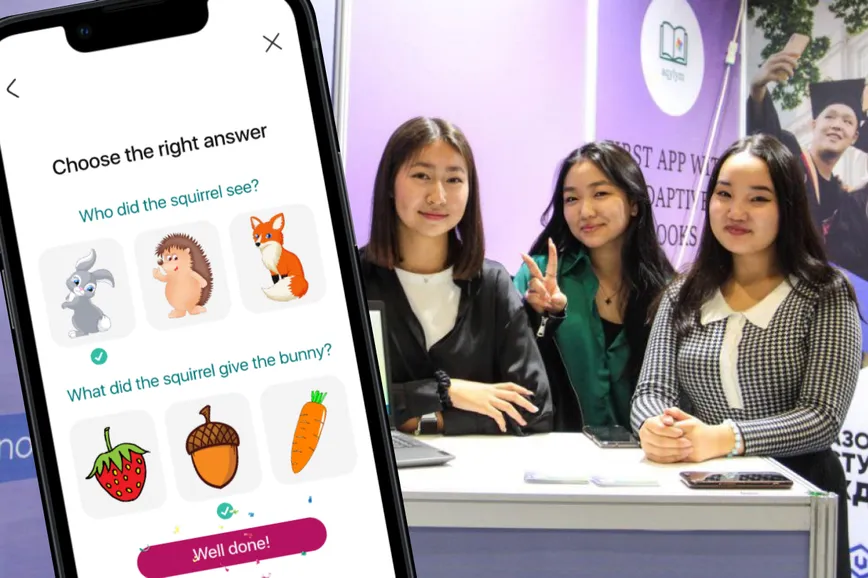Around the world, approximately 10% to 15% of preschool children experience some form of developmental delay in their learning path. Educational and medical institutions worldwide have implemented various practices and treatments to address these issues.
However, in recent years, there has been a surge of grassroots initiatives that have taken shape in the form of medtech and edtech startups, with the aim of tackling these issues and making learning inclusive for all children.
Among them is the Aqylym app, deriving its name from the Kazakh word of endearment. To call a child aqylym is to call them clever, encouraging them to strive for and learn more.
Developed by a small team consisting of five people, the app is designed to provide continuous cognitive preventive care. QazMonitor reached out to Tansholpan Zhanabekova, the app's UX designer, and Amina Smagulova, the project’s manager and content creator, to discuss their inspiration behind developing the app, how they’ve gamified learning, and their plans for launch.
Pain point relief
How did you come up with the idea behind Aqylym?
Аmina. We have relatives who struggle with the same things. They're all adults now but still face difficulties in day-to-day life because they're different. They went through the Soviet schooling system and didn’t have an individualized, adaptive approach that could accommodate their distinct way of seeing the world. So, this idea came from our personal experiences and concerns about the lack of inclusive education in our country.
We wanted to create a tool for continuous cognitive preventive care for children with special needs, which would allow parents to have a reliable app to educate their child on a regular basis. Because without constant treatment and an exercise routine, the severity of the disorder will worsen.
Not all parents have the time or finances for special treatment facilities. Some even quit their jobs [to support their kids]. So, we came up with a more budget-friendly way to help them and alleviate this 'pain point’.
Gamifying learning
How do you design the games for the app?
Tansholpan. As a UX designer, I put together all the visuals. Along with Amina, we developed games – she wrote the books, and we then used them as the basis for the game development.
I did the visuals based on gamification principles to make the games more appealing to kids. With a simple and easy-to-understand interface, I tried to encourage them to read, while also making the game interesting enough for them to spend more time playing it.
What disorders does it cover?
A. Initially, we focused on developmental delay as a diagnosis, which is an umbrella term for many subdiagnoses. [Later] we shifted our focus to children who, for example, can read a text in syllables but struggle to articulate its content. So, our core learning technology revolves around children reading adaptive books, broken down into syllables and adjusted to their needs.
After reading, the children play a game based on the story they just read. For example, if the book was about animals in the forest, the game would involve questions such as “Who did the squirrel see in the forest?” or “What did the squirrel give to the hare?”
How does the Aqylym work?
A. The child reads a book, plays a game, and earns points, which are then used to track their progress. The progress is then sent to the parents' email so that they can see that their child is regularly engaged.
The games are divided into dedicated sections to tackle specific cognitive tasks. Some games require quickness, some require attentiveness, and others are designed to help with memorization, broadening one's horizons.
Parents can take tests in our app to measure their child's progress. It asks questions such as, "Does your child have trouble throwing a ball?" and provides answer choices like "Yes," "Often," "No," or "Not observed anymore." This helps to track progress and see how much the child’s cognitive skills have improved since the start.
Last stage before launch
How do you plan to scale your project?
A. Right now we are participating in incubation programs at Nazarbayev University, – NURIS and ABC Incubation – where we receive support from experts, mentors, and trackers. The app is ready, we have a complete design and production-ready code for Android. Currently, we’re developing the code for iOS.
In terms of promotion, we plan to secure funding from the programs in the near future, as well as from various foundations. Now, we are submitting applications and participating in contests where we present our ideas and startup.
What kind of a monetization plan do you consider?
A. The app itself will be free, but there will be a subscription if the user wants to add more books. The free version will have about 10-15 books available.
We calculated that a monthly subscription to Aqylym would cost less than a consultation with a speech therapist or other specialists. So, it is more affordable for parents.
When do you plan to launch your app?
А. After we get the funding, I think it will happen this summer. Last spring, we presented our app to the education ministry and received a positive review from them. The team is now establishing partnerships with domestic development centers, and we also received consultations from Stanford University. As a member of the [Stanford’s] neuroscience club, I consulted with professors about our app and ways to develop our methodology with a greater emphasis on scientific methods.
Т. We already have a focus group, received reviews and feedback from many people, and presented our app to various centers that have shown interest. [All that's left] is to pass the final stage of the incubation program.
